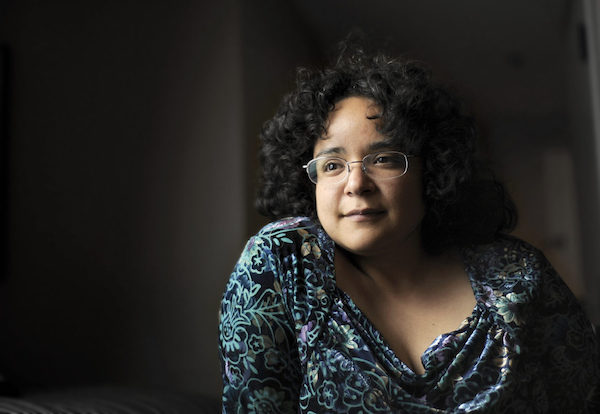Boston Artists Ensemble opens with operatic drama, Frank premiere

Gabriela Lena Frank’s “Operetta” was performed in its world premiere by the Boston Artists Ensemble Friday night in Salem. Photo: Mariah Tauger
After putting the finishing touches on her first opera (El último sueño de Frida y Diego, to be debuted next month by San Diego Opera), Gabriela Lena Frank filled her free time by musing on the very notion of theatrical spectacle. What emerged from those thoughts was a new work for violin and cello that explores operatic concepts.
But Operetta, commissioned by Boston Artists Ensemble for its season-opening concert, never resorts to imitation or cliché. Heard in its world premiere at Salem’s Hamilton Hall Friday night, the score instead depicts the visceral nature of drama itself.
Frank’s music consistently offers an attractive combination of technical fluency and earthy substance. Her Hilos for chamber ensemble and Leyendas for string orchestra recall Bartók and Ginastera, where folk melodies and rhythms are intricately woven into every passage.
Yet Operetta eschews such indigenous elements. Rather, its brief 11 minutes showcase violinist and cellist interacting like estranged family members in an argument that is at once earnest, passionate, even outright hostile.
Frank achieves this by painting a dissonant landscape throughout the work’s brief five movements. Her tasteful melodic writing borders on austerity. Lines passed between the strings in the opening “Prologue” convey an uneasy calm. Two “Arias” and a “Recitative” make up the work’s center, and each unfolds in a display of brooding intensity, rhythmic angst, and angular lyricism. Like an operatic mad scene, the finale brings it all to a fiery conclusion.
In Friday’s performance, violinist Lucia Lin’s raw intensity proved an ideal foil for cellist Jonathan Miller’s assured phrases, making a compelling case for Frank’s score.
The rest of the program, consisting of piano quartets by Mozart and Fauré, offered warmer contrast.
Written one hundred years apart, Mozart’s Piano Quartet in E-flat major, K.493 (1786) and Fauré’s Piano Quartet in G minor, Op. 45 (1885) are marvels of formal logic. Yet both composers captured a timeless sense of tension and release.
Written after the premiere of The Marriage of Figaro, Mozart’s quartet shares a similar wit and exuberance. Yet the Boston Artists Ensemble brought out a surprising mystery in the score. Diane Walsh’s pearly piano tone complemented the dusky strings in the Allegro. In the Larghetto, the ensemble’s dark harmonies brought palpable gravity to each moving line. The finale, rendered with elfin humor, made for a joyous resolution.
Fauré preferred the intimacy of the salon to the concert hall. Yet his Piano Quartet in G minor explores storm, stress, and the repose that follows in near-theatrical style.
From the onset, the musicians matched each other’s melodic sweep. They approached the ensuing Scherzo with similar live-wire energy. Lush string blend and delicate piano chords made the Adagio into a soulful departure. The finale found the ensemble channeling playfulness, grandiosity, and ultimate serenity—about as operatic as one can get in chamber music.
The program will be repeated 3 p.m. Sunday at St. Paul’s Church in Brookline. bostonartistsensemble.org
Posted in Performances




